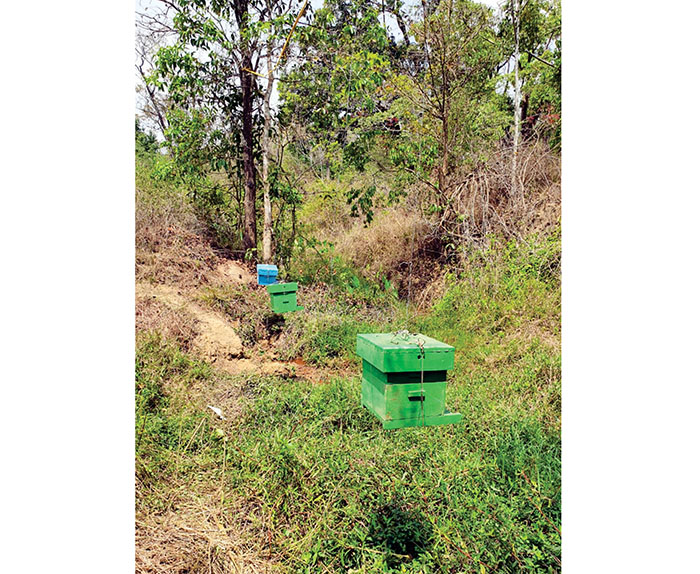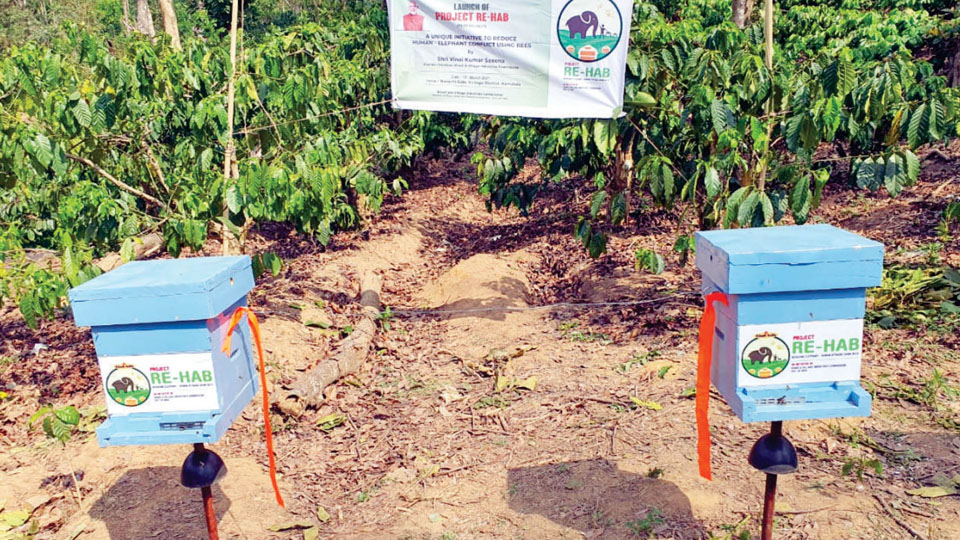Pilot project RE-HAB (Reducing Elephant – Human Attacks using Bees) taken up at five locations in Kodagu by KVIC
Mysore/Mysuru: With a view to reduce human-elephant conflicts in the country, Khadi and Village Industries Commission (KVIC) has launched a unique project of creating “bee-fences” to address this burning issue in several States including Karnataka.
The pilot project was lau-nched at 5 locations in Kodagu by KVIC Chairman Vinai Kumar Saxena — two in Chelur village near Kadanga, one at Nanachi Gate near Kutta and two more at Kodangi Haadi near Nagarahole. These spots on the periphery of Nagarahole National Park are known to be human-elephant conflict zones. Total cost of project is Rs. 15 lakh.
The objective of the Project RE-HAB (Reducing Elephant – Human Attacks using Bees) is to thwart elephant attacks in human habitations using honey bees and thus reduce fatalities of humans as well as retaliatory deaths of elephants in the hands of humans. Project RE-HAB is a sub-mission of KVIC’s National Honey Mission. While the Honey Mission is a programme to increase the bee population, honey production and bee-keepers’ income by setting up apiaries, Project RE-HAB uses bee boxes as a fence to prevent the attack of elephants.
KVIC has set up 15-20 interspersed bee boxes at each of the four locations. The bee boxes are set up in the passage ways of elephant-human conflict zones to block the entrance of elephants to human habitations. The boxes are connected with a string so that when elephants attempt to pass through, a tug or pull causes the bees to swarm the elephant herds and dissuade them from progressing further. Bee boxes have been placed on the ground as well as hung from the trees to block the passage way of elephants. High resolution, night vision cameras have been installed at strategic points to record the impact of bees on elephants and their behaviour in these zones.
Saxena said this unique initiative has been taken as a sustainable resolution to the human-elephant conflicts that are common in several parts of the country. “It has been scientifically recorded that elephants are annoyed and even frightened of honey bees. Jumbos fear that the bee swarms can bite their sensitive inner side of the trunk and eyes. The collective buzz of the bees is annoying to elephants that force them to return. Elephants, which are the most intelligent animal and carry their memories for long, avoid returning to the place where they have encountered honey bees.”
“The biggest advantage of Project RE-HAB is that it dissuades elephants without causing any harm to them. Besides, it is extremely cost-effective as compared to various other measures like digging trenches or erecting fences,” he added.
Nearly 500 people die every year due to elephant attacks in India. This is nearly 10 times more than the fatalities caused by big cats across the country. From 2015 to 2020, nearly 2,500 people have lost their lives in elephant attacks. Out of this, nearly 170 human fatalities have been reported in Karnataka alone. On the contrary, nearly one-fifth of this number, that is nearly 500 elephants have also died in retaliation by humans in the last 5 years.

In the past, Governments have spent crores of rupees on digging up trenches and erecting fences to dissuade elephants. Also hundreds of crores of rupees have been spent on compensation for loss of human lives. These trenches and barbed wire fences have often caused the deaths of elephant calves and thus rendering these ideas largely impractical.
Earlier, Central Bee Research and Training Institute, Pune, which is a unit of KVIC, had conducted field trials of creating “bee-fences” in Maharashtra to mitigate elephant attacks. However, this is for the first time, KVIC has launched this project in totality.
KVIC has roped in the College of Forestry under the University of Agriculture and Horticultural Sciences, Ponnampet, for impact assessment of the project. KVIC Chief Advisor (Strategy & Sustainable Development) Dr. R. Sudarshana and Dr. C.G. Kushalappa, Dean of the College of Forestry, were present on the occasion.
| Human Deaths Due to Elephants | |
| Year | Deaths |
| 2014-15 | 418 |
| 2015-16 | 469 |
| 2016-17 | 516 |
| 2017-18 | 506 |
| 2018-19 | 452 |
| Total | 2,361 |
| State-wise Death of Humans (2014-15 to 2018-19) | |
| States | Deaths |
| West Bengal | 403 |
| Orissa | 397 |
| Jharkhand | 349 |
| Assam | 332 |
| Chhattisgarh | 289 |
| Karnataka | 170 |








Recent Comments